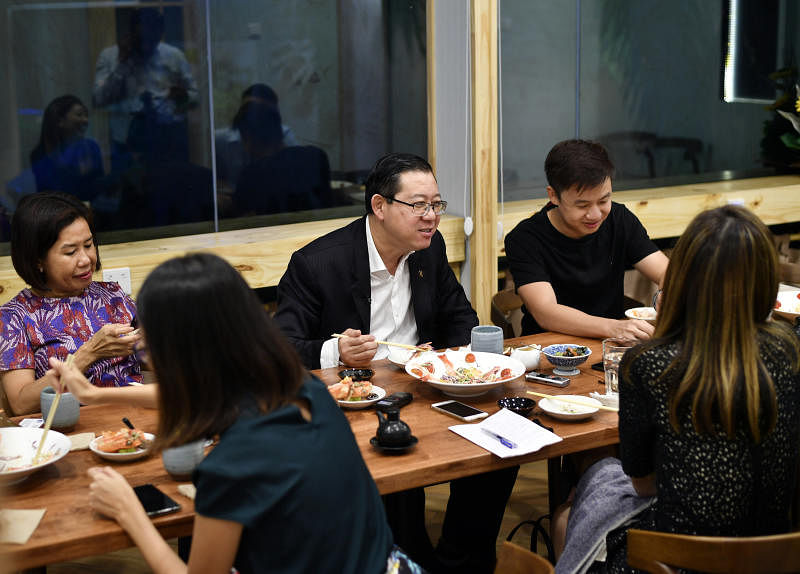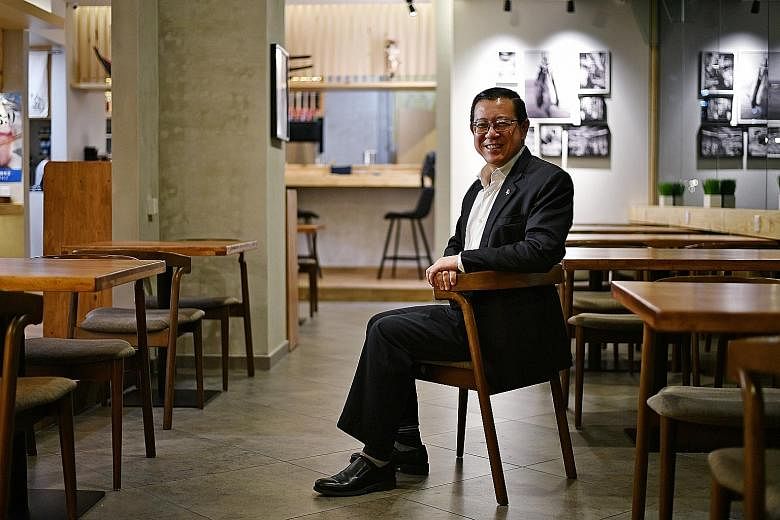Dinner with Malaysian Finance Minister Lim Guan Eng is set for 8pm, but he is running late.
He has Cabinet papers to clear, explains Rahmah, his friendly press officer, who is waiting with us at a Japanese restaurant in Kuala Lumpur's Central Business District last Monday.
She apologises several times for the delay and messages Mr Lim's security officer for updates. At about 9.15pm, she gets word that he has left his office in Putrajaya.
On a day with clear traffic, it takes about 30 minutes to drive from Malaysia's administrative centre to Jalan Raja Chulan.
The newly opened Tsukiji No. 8 restaurant is on the first floor of Wisma Lim Foo Yong there.
Traffic in the area had been agonisingly slow when we took a taxi to the restaurant earlier, but it has since cleared.
With me are Shannon Teoh, The Straits Times' Malaysia bureau chief, Malaysia correspondent Trinna Leong, photographer Ariffin Jamar and videographer T.K. Raju.
Because of the late hour, we decide to place some orders first, to be served when Mr Lim arrives. Soon after, though, Rahmah gets a call from her boss. Yes, she says, we have ordered. He tells her the restaurant "knows what I like".
He hangs up and we're in a bit of a quandary. Should we cancel our orders? We decide to keep some of the dishes and let the restaurant decide the rest. We head to the ground floor to wait for him.
The bureau in KL had been told earlier in the day that Mr Lim's wife and one of his sons will be joining us for dinner. We spot them by the escalator.
Madam Betty Chew, 53, who's in a floral top and jeans, was at one time a Melaka state assemblywoman, standing under the Democratic Action Party (DAP) where her husband is secretary-general.
In 2013, she made headlines for shaving her head to protest against money politics.
Marcus, 23, who has a friendly smile, is the third of their four children.

Mr Lim arrives, driven in a Proton Perdana. He has a bodyguard but no outriders.
The 57-year-old is commonly known as YB, the initials of his Yang Berhormat (The Honourable) title, which is how I address him.
He has a casual, down-to-earth manner, honed from more than 30 years in opposition politics. He's friendly and during the interview, mentions my name no fewer than a dozen times in his replies.
But there's no mistaking something no-nonsense about him. His jocular manner also belies a teasing - or sarcastic, depending on whether you're the target - edge.
We make our way up the escalator into a private room in the brightly lit restaurant. He sits flanked by his wife and son. "Makan first," he says, apologising for being late. "You all must be starving."
We are, although probably not as hungry as he is. Dinner is often his first proper meal of the day - "because you all work me to death," he jokes to Rahmah - and his day starts at 7.30am.
The food arrives quickly and he tucks in. "Eat, eat," he urges, deftly mixing the dressing onto the shrimp salad. When he spots Ariffin and Raju with their cameras, he calls out: "You got makan?"
He seems happy enough with our orders of sashimi and sushi rolls. But he looks askance when the waiter brings in the restaurant's house speciality, Ocean's 8.

Mounds of uni, crab meat, scallop and fish roe are artfully arranged on rice and served in an impressive crab shell.
"How do you eat this? Dig it out, is it?" he asks. He passes on the dish. "You all take this. Even though he did it for me, I'm not very keen."
At one point when he sees more dishes being brought in, he protests to the restaurant owner, who is checking in.
"Cannot be like this," he tells the man a tad sternly. "We come here, you also must treat us fairly, OK?
"It's excessive. You have done it, you leave it here, never mind. But not too excessive. We don't want to waste it."
IF NOT for our dinner, he would still be in Putrajaya, reaching home only around midnight.
"She'll be sleeping ," he laughs, looking at Madam Chew. She and Marcus keep a silent presence during the meal.
Their home is still in Penang, where he was chief minister from 2008 till the recent general election which saw the Pakatan Harapan (PH) opposition alliance come into power.
He rents a place in KL but returns home on weekends.
"I miss Penang, hell, I miss Penang. The food, the people."
The DAP is one of the parties in PH, whose shock win on May 9 resulted in a surreal series of events still playing out in Malaysia today.
Tun Dr Mahathir Mohamad became prime minister again at the age of 92. Former PM Najib Razak's homes were raided and millions in cash, jewellery and designer bags seized. He has since been arrested and charged with corruption.
Mr Lim's appointment to the important and politically sensitive finance portfolio also raised eyebrows and some protest.
The economic power of the Chinese minority has always been a sensitive issue in Malay-dominant Malaysia. Mr Lim is only the third ethnic Chinese to helm the portfolio, which Najib himself held.
But Mr Lim, a former banker and qualified chartered accountant, comes with an impressive track record of turning Penang into one of the largest contributors to the country's economy.
I ask if he thought he'd be Finance Minister.
He says PH winning the federal election came as a shock.
"We thought we'd get a hung Parliament, not realising that actually we won quite easily."
He adds: "I never predicted I'll be chief minister of Penang and that one day I'll be the Finance Minister of Malaysia, never in my wildest dreams. I never even dreamed of that. I just hoped that I won't get detained here and there."
Under Dr Mahathir's earlier prime ministership, Mr Lim was jailed during a political crackdown in 1987, and again in 1998 under the Sedition Act over comments about an underage rape case.
His father, former DAP secretary-general and opposition leader Lim Kit Siang, was also detained twice under the Internal Security Act.
I ask the minister about his relationship with Dr Mahathir.
"He's my prime minister," he says simply. It's clear he is not going to say more.
Is he happy with the number of Cabinet positions the DAP got in the coalition government?
"It's a tough question to answer, so I will not answer."
He's freer with his views of Najib and the debacle involving state fund 1 Malaysia Development Berhad (1MDB).
Mr Lim has estimated that Malaysia is staring at a RM1 trillion (S$336.3 billion) debt.
I wonder if the euphoria that swept the country after the election has died down, and he says it hasn't because people "cannot believe that the big bad wolf has gone away".
He shakes his head at the items that have been seized from homes linked to Najib, including 14 tiaras.
"When people say tiara, they thought it's a car, Proton Tiara. Then you realise they're actually much more valuable than a car. It really steals away your appetite."
But he adds: "At the end of the day, I always tell myself that we count ourselves blessed that we managed to get them removed this round. If we waited one more round, there's nothing left to save."
He repeats an analogy he has used in other interviews. "We look at the glass half full, not half empty."
He points to my glass to illustrate this and notices that it is in fact two-thirds empty. He beckons the waiter: "Can I have some water here? Hello, water here."
He returns to his glass analogy.
"At least you can turn things around, maybe a bit painful but you turn things around. So if we had waited one more term, too late. Sumiko, too late, really too late."
HE IS curious how Singaporeans feel about events in Malaysia.
"Are they fascinated about what's going on here?"
He was born in Johor Baru and has relatives in Singapore. His father, who's now 77, worked in Singapore, including as a reporter at The Straits Times, and has links with some of the People's Action Party's Old Guard.
The DAP was founded in Malaysia in October 1965, after Separation, by former members of the deregistered People's Action Party of Malaysia.
Mr Lim last visited Singapore about three years ago. He says he has many Singapore friends, including from his church network.
What about Singapore's political leaders? How well does he know them? Not at all, he says.
"They're never interested in knowing us," he says, referring I suppose to the DAP, and adding later that "in the past, there's never any need to know us".
What is it like working with Singapore? "Well, you've got to be on your toes," he says.
In what way?
"In many ways," he replies.
"Look at the contract, make sure you know what you're heading into. You've got to be alert."
A sore point that emerges is how Singapore has soaked up Malaysian talent. "You give employment to some of our best chaps... You look at so many industries, they're all staffed by Malaysians."
It's not Singapore's fault that Malaysians want to work there, I counter.
"I know, I'm not saying it's your fault but... you all very good, lah, at getting people."
He shares how he once invited Singapore's former top civil servant Philip Yeo to Penang for a lunch.
At the event, Mr Lim presented prizes to Malaysian students who had won an international science contest.
Mr Yeo later approached the students to offer them scholarships to Singapore, he relates.
Yes, I say, Mr Yeo believes in "kidnapping" talent for Singapore.
"Kidnap? More like cradle snatching," Mr Lim sniffs.
He concedes: "If we don't value our own talent, do you blame other countries for helping them? What I need to do is to make Malaysia more attractive again... a place of hope... and I'm sure that Malaysians will come back."
He says with feeling: "You can't beat the food here, the space and greenery, the natural beauty. You can't beat the people here, the heritage, the culture, everything."
On ties with Singapore politicians, he shares that Singapore Finance Minister Heng Swee Keat had called him.
He was struck by how Mr Heng had quoted back to him something he had said in a farewell message to Penangites.
"I was very impressed in that he knows me. He makes an effort. Even though he speaks to me for the first time, he makes the effort."
Are bilateral visits on the cards then for both sides to get to know each other? After all, some issues have already cropped up, with Dr Mahathir saying he sees no need for a cross-border high-speed rail, and questioning the price Malaysia sells its raw water to Singapore.
Any visit will depend on Dr Mahathir, says Mr Lim.
He agrees with his prime minister that the price Singapore is paying for raw water from Malaysia is too low and describes the contract as "lopsided".
Under a 1962 agreement, Singapore pays three sen per 1,000 gallons of raw water, and sells treated water back to Johor at 50 sen per 1,000 gallons.
What is often left out is that it costs Singapore RM2.40 to treat every 1,000 gallons of water, and Johor sells the treated water to its people at RM3.95 per 1,000 gallons.
Mr Lim feels that given Malaysia's debt situation, Singapore might want to revise the price, framing this as a "goodwill" gesture. "Just be perhaps understanding. I don't want to use the word 'compassionate'. Understanding."
He then lobs this line: "Maybe compassionate is not in the Singaporeans' vocabulary."
He ignores my gaping mouth at this, and continues: "Some sort of goodwill gesture.
"I mean, it wouldn't cause you to go bankrupt and wouldn't even put a dent in your GDP. It will generate a lot of goodwill."
PUTTING the Malaysian economy right is top on his to-do list.
"The Achilles heel in any election is the economy," he says, and it's crucial that benefits reach all segments of the population.
Malaysia had 5.9 per cent gross domestic product growth last year, but the benefits did not filter down, he notes.
He believes Malaysia must be both "an entrepreneurial and a welfare state" with positive and sustainable growth, as well as a strong safety net.
The new Malaysia must also value basic human rights and genuine freedom of the press. So there is freedom of the press now?
Much more, he says, although the media is still controlled by political parties, which he feels is wrong.
"There should be some sort of laws against it."
A more open press means "we get whacked left, right and centre... but we take it in stride because that's part of a free society".
And does he give interviews freely, including to media that weren't friendly in the past?
He says there are Malaysian media he doesn't trust.
"Trust is not built overnight."
On the personal front, the corruption trial he faces in Penang has been postponed to July 30 and his lawyers are asking for the charges to be dropped.
They relate to land use and payment of a plot of bungalow land.
He says due process will take its course, but reiterates that the matter was politically motivated.
The election results "clearly showed that people supported or accepted that this was purely politically motivated to finish me off".
I ask if there will be a third generation of Lims going into politics, but he says it won't happen as his children aren't interested.
"Two in the family go to prison, enough, lah, don't put the whole family in."
You've had a very interesting political life, I remark. Too interesting sometimes, he replies.
I ask him to describe the place he's at now. "In opposition, you were the check and balance... Now, you've got to deliver. You know, Sumiko, that's tough."
It's past 11pm by the time we finish but his energy hasn't flagged. He poses for photos cheerfully then takes his leave, urging me to visit Penang. His night is not done as he has another appointment before he heads home, and then it's back to Putrajaya by 7.30am.
Twitter @STsumikotan


